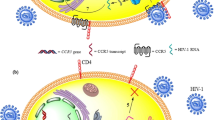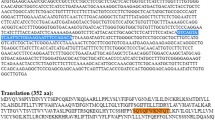Abstract.
Carriers of the Δccr5 allele, which contains a deletion of 32 bases in relation to the normal allele of the β-chemokine receptor gene (CCR5), have increased resistance to HIV-1 infection. The higher frequency of this mutation in Europeans than in Blacks and Asians, has generated interest in determining its distribution in other populations. The population of this study involved 300 Amerindians from four Brazilian Amazon tribes (Tikuna, Baniwa, Kashinawa, and Kanamari). All of the individuals were homozygous for the normal allele, which corroborates the hypothesis that the Δccr5 allele has a European origin, and that its occurrence in urban populations in South America is the result of immigration.
Similar content being viewed by others
Author information
Authors and Affiliations
Additional information
Electronic Publication
Rights and permissions
About this article
Cite this article
Leboute, A., de Carvalho, M. & Simões, A. Absence of the Δccr5 mutation in indigenous populations of the Brazilian Amazon. Hum Genet 105, 442–443 (1999). https://doi.org/10.1007/s004399900154
Received:
Accepted:
Issue Date:
DOI: https://doi.org/10.1007/s004399900154




